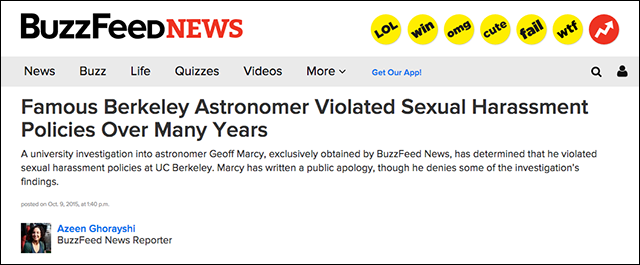President's Column: A Letter to AAS Members on Sexual Harassment
C. Urry Yale University
Dear Colleagues,
The past week has been a difficult one for the astronomical community, with many news stories (e.g., BuzzFeed, New York Times, Nature) about Prof. Geoff Marcy’s sexual harassment of students, followed by the announcement about his resignation from the University of California at Berkeley. After considerable discussion of all available information, the AAS has issued a statement condemning the sexual harassment of students by faculty and commending the complainants whose bravery in speaking out has protected other students.
Now it is important to think about the lessons learned and about next steps. The AAS has an effective anti-harassment policy that applies at meetings and activities of the AAS. It outlines a clear process for investigating complaints and, if need be, applying sanctions, and this process has been carried out reasonably effectively a few times over the past few years. The anti-harassment policy, as well as the code of ethics that applies to the actions of members in the broader professional space, represents our values and our belief in the importance of ensuring that astronomers “enjoy an environment free from all forms of discrimination, harassment, and retaliation.”
However, the present situation has made clear that our code of ethics needs to be updated. While it quite clearly states that “All people encountered in one’s professional life should be treated with respect” and that “More senior members of the profession, especially research supervisors, have a special responsibility to facilitate the research, educational, and professional development of students and subordinates,” including their responsibility for “providing safe, supportive work environments,” it uses vague language to characterize unacceptable behavior and provides no guidance on how to trigger or conduct an investigation, nor on the possible sanctions that might ensue.
Accordingly, I have appointed three AAS Officers — Dara Norman (AAS Councilor and chair of the task force), Jack Burns (AAS Vice-President), and Christine Jones (AAS President Elect) — to a task force on revising the AAS code of ethics. This task force will study similar policies at other scientific societies; change or augment descriptions of proscribed behavior in the code; develop a set of procedures for initiating and carrying out an investigation of a member who appears to be in violation of the code; and define the possible sanctions available to the AAS, and whether those should include prohibition from meetings, expulsion, and/or other steps. The new procedures and sanctions will be developed with recent events in mind but will be applicable to the much broader suite of misconduct defined in the code of ethics. I have asked this task force to work as quickly as possible, ideally reporting its recommendations to the Council at the January 2016 meeting.
Once the new procedures are in place, the AAS can respond to the many suggestions that have come in, for example, regarding whether to terminate Prof. Marcy’s AAS membership, and we can respond to any new complaints about ethics violations by any astronomer. Until then, we have no defined process for doing so.
An aside: I and other Council members have received hundreds of emails over the past week from colleagues with thoughts, suggestions, criticisms, and more. We welcome this input. The AAS is a member society, with governance that is elected and responsive. We may not always be able to answer immediately (I know I can’t), but we will read and consider everything.
We must now move past this crisis. Geoff Marcy is not the only astronomer who has been accused of harassing subordinates. Nor is this form of harassment the only problem astronomers encounter — there is racism, sexism, able-ism, homophobia, class-ism, and discrimination in many other forms. Some incidents might seem quite “small” if looked at in isolation, but the cumulative effect can still be very negative. In an op-ed on sexual harassment for Scientific American yesterday, I described a typical experience for a young woman at a scientific conference (which is a hybrid of several different stories I have heard from young women).
I know that conversations are happening all over this country, and perhaps the world, in astronomy departments and in other disciplines. So many questions need to be answered. Why were complaints at Berkeley ignored for at least a decade? Why did our profession take so long to act if the behavior was an “open secret”? What are the responsibilities of bystanders? How can we protect whistleblowers whose status is well below that of the people they accuse? Does vulnerability excuse a failure to report? Could there be repositories of complaints that, in and of themselves, would be difficult to investigate and might not trigger major concern, but that when repeated time and time again, rise to a firing offense? And quite apart from the egregious harassment that is easily identifiable, what can we do to make our lecture rooms, our student offices, our faculty enclaves, and our meetings truly welcoming and supportive environments for all?
There is much to talk about. I look forward to discussions with you, my colleagues. Most of us want and support open, supportive, positive environments, and most of us do not knowingly violate the common trust. Thank you to everyone who works to keep our profession open to all — I know we can make astronomy a model for a progressive, productive scientific community.


